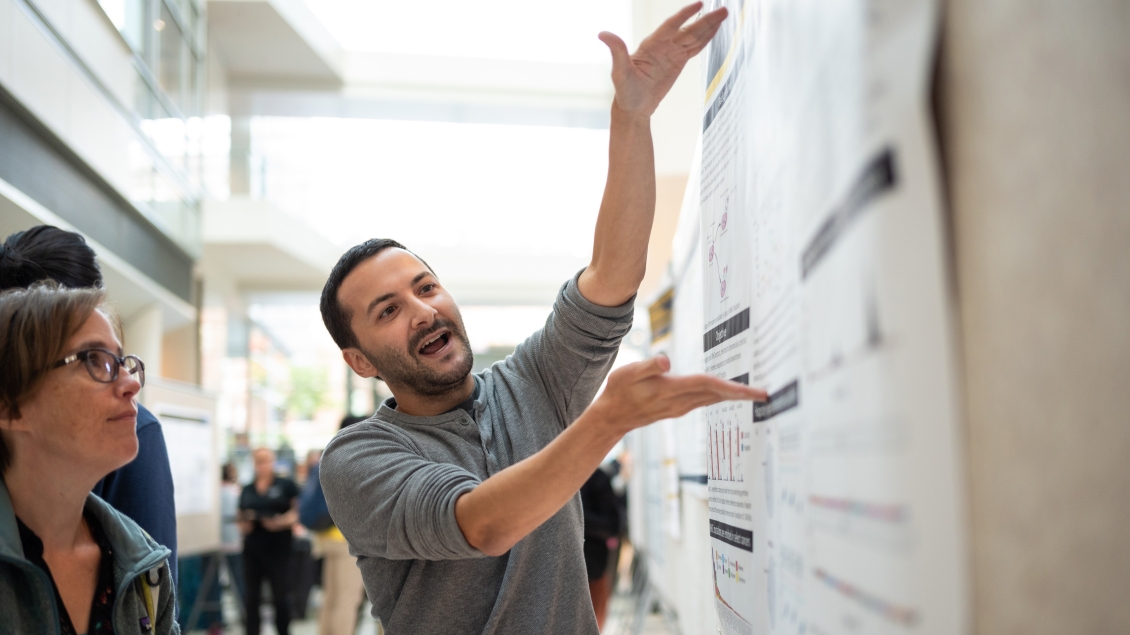-
Applications to Complex Genetic Diseases -
Biomedical Data Science, Translational Bioinformatics & Pharmacogenomics -
4D Nucleome -
Genomics, Regulatory Genomics & Epigenomics -
Methodological Development in Computational Biology -
Multi-“omics” Integrative Bioinformatics -
Protein Structure, Proteomics & Alternative Splicing -
Systems Biology & Networks Analysis -
Software & Bioinformatics Tools -
Grants

Translating Theories into Practice
We leverage innovative technologies to investigate how hidden information in genes and biological molecules can further personalize the diagnosis, treatment and prevention of diseases.
The research focus of the Department of Computational Medicine and Bioinformatics (DCMB) is to create novel and impactful informatics and computationally based AI and Machine Learning methods, tools, algorithms, and information resources to enable and extend basic and clinical research discoveries and methods.
Working with our students and post-docs, we provide the ideal environment to learn by creating our research and publishing our impactful findings in leading journals. Our research is supported by the National Institutes for Health (NIH), the National Science Foundation (NSF), the Defense Advanced Research Projects Agency (DARPA), and many non-for-profit Foundations and research organizations.
Our faculty engage in a vast spectrum of bioinformatics and computational biology research, analyzing unanswered questions spanning cancers and neuropsychiatric disorders to metagenomics and translational informatics. There is still much to explore at the intersection of biology, computational science, mathematics and medicine. Our faculty are nationally recognized leaders in this highly interdisciplinary field.
View a collection of publications from the Department of Computational Medicine & Bioinformatics.
Learn more below about the research being conducted across 8 focus areas. All in the context of the growing field of Artificial Intelligence and Machine Learning.
By their very nature, computational medicine and bioinformatics are very collaborative. DCMB and CCMB members are engaged with many U-M partners.
- Precision Health
- Weil Institute for Critical Care
- Eisenberg Family Depression Center
- Health Data
- School of Public Health
- Radiation Oncology
- Rogel Cancer Center
- College of Pharmacy
- Center for Metabolic Diseases
- Caswell Diabetes Institute
- Kellogg Eye Center
- Internal Medicine
- Michigan Neuroscience Institute
- Institute for Heart and Brain Health

Graphic that shows DCMB at the core, surrounded by a ring with the various fields of computational medicine and bioinformatics applications. On the outside are "petals" with the name of collaborating units at U-M: Precision Health, Weill Institute for Critical Care, Eisenberg Family Depression Center, Health Data, School of Public Health, Radiation Oncology, Rogel Cancer Center, College of Pharmacy, Center for Metabolic Diseases, Castell Diabetes Institute, Kellogg Eye Center, Internal Medicine, Michigan Neuroscience Institute, and the Institute for Heart and Brain Health. This graphics looks like a flower with a maize and blue core, and colorful petals.
BioAssemblyBot®, an ultra precise robot affectionately referred to as "she," makes repetition her core mission. Her infatigable ability to precisely repeat the same test using different samples in mere hours gives time back to our scientists to design the best possible experiments.



